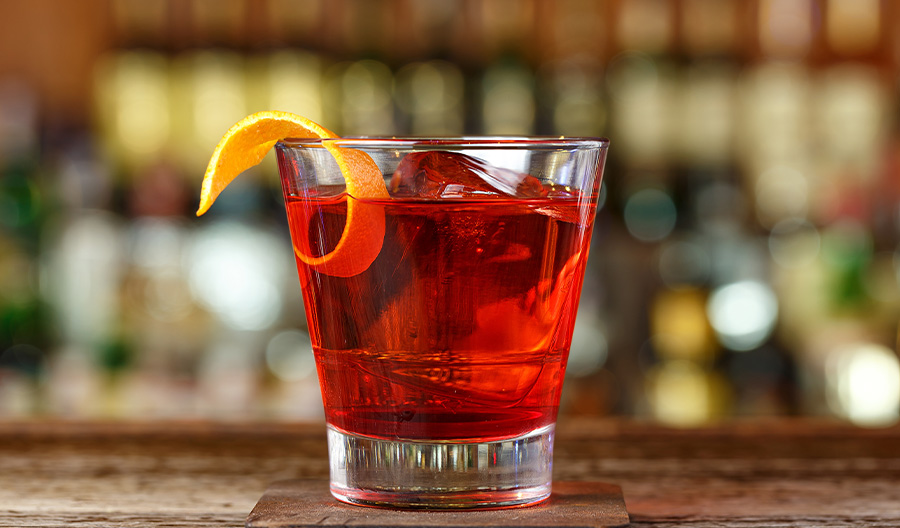Vermouth, the aromatized fortified wine, traces its history all the way back to 1250 B.C.E. in China, when drinkers first began consuming wine infused with roots or herbs. Over time, the beverage that’s today known as vermouth evolved, changing as it went in and out of popularity across the globe, from Hungary to Germany, France and Italy. Today, it’s one of the most common ingredients in cocktails, used in everything from the Manhattan to the Martini to the Negroni and far, far beyond. Vermouth can even be enjoyed straight—just ask the Catalans.
Of course, we always seem to run out of vermouth at the worst times. But there’s no need to panic. Excellent substitutes abound. Although there exist several different styles of vermouth, for the purposes of this article, we’ll focus on two—sweet and dry vermouth—because they’re the most common.
First thing’s first, though: Unlike high-proof spirits, vermouth can go bad. Its alcohol-by-volume (ABV) is just slightly higher than table wines, which means it’s vulnerable to oxidation. The second issue that people tend to forget? Once opened, it should be stored in the refrigerator.
Either way, not having vermouth on hand for whatever reason is a pain. So, what can you use if you run out? Good news, there’s a lot of substitutes that will come through in a pinch—and potentially even improve your favorite cocktails.
Here’s a look at the best vermouth substitutes.

Sweet Vermouth Substitutes
Antonio Benedetto Carpano essentially created the modern vermouth rush when he first made sweet or “rosso” (red) vermouth in Turin, Italy, in 1786. When poured, it looks a bit like Coca-Cola, thanks in part to the touch of caramel coloring. It’s got a touch of sugar to taste, but is also bitter and acidic. In Europe, it’s enjoyed straight, as well as in mixed drinks. In the U.S., however, sweet vermouth tends to be used in drinks like a Manhattan or Negroni.
If your bottle of sweet vermouth has run dry, no problem. Here are some other beverages you can use in your cocktail instead.
Port
You can use a few different styles of Port in vermouth’s place.
Sherry
For a Manhattan, Shea looks to Sherry, particularly Pedro Ximénez (PX) or cream Sherries, because they can add bold flavors with a touch of sweetness.
Amaro
Amaro is an expansive category of spirits and it never hurts to have a few bottles on hand. Amaro is a great substitute.
Coffee Liqueur
Vital for drinks like the espresso martini and Black Russian, coffee liqueur is a must-have for your bar cart. Another added bonus, it can also act as a vermouth substitute.
Dry Vermouth Substitutes
A decade after sweet vermouth rolled out, one French distiller launched the first dry vermouth in France. Dry vermouth tends to be more herbaceous and has less residual sugar. It’s also either clear or pale in color. If you’re out, here are some other options to use in its place.
White Port
Dry vermouth is most famously used in a martini—one of only two ingredients. So, with a drink so straightforward, how does one replace the ingredient without making an entirely different cocktail? Shea suggests white Port as a great substitute, reminding us that the “old Hollywood mainstay the Hi-Ho [cocktail] used it as their house martini.”
Saké
You can also opt for saké, but finding the right one to match the flavor profile of your drink can be a bit difficult. But of course, “for the daring, the right saké can sing,” says Steuck.
FAQs
Can I Substitute Dry Vermouth for Sweet Vermouth?
Yes, you can substitute dry vermouth for sweet vermouth. But it will change the flavor profile of your drink.
“Dry vermouth can make a great substitute for sweet vermouth,” says Shea. “Because the botanical base is traditionally different, it can provide a different taste, and a drier finish. You can always add a dash of simple syrup if needed.”
Can I Substitute Vermouth for White Wine?
Yes, but there are some factors you’ll want to consider.
“It just depends on the substitution,” suggests Steuck. “If for an apéritif before a meal or even a nice little seafood appetizer pairing, maybe even via a spritz, I say yes.” He also notes this swap can work in cooking. But if you’re considering pouring a glass of vermouth instead of white wine, don’t. “I’d stay clear,” he says.
When cooking or making cocktails, Shea sees dry vermouth and a crisp dry white wine being able to switch out for each other “in a pinch, especially one with some minerality like a Sauvignon Blanc.”
Can You Substitute Sherry for Vermouth in a Recipe?
Sherry is one of the best substitutes for vermouth.
“Sherry has such a broad spectrum that it can be used to replace any kind of vermouth,” says Shea. “For drier cocktails like the martini, Fino or Manzanilla add a layer of flavor and a touch of salinity. For richer cocktails like the Old Fashioned or Manhattan, PX or cream Sherries can add bold flavors with a touch of sweetness.”
Steuck’s preferred way to make this cocktail substitute is in a martini, as he “loves how it can elevate and add a touch of nuance to the flavor of your favorite gin or vodka.”
What Can I Substitute for Vermouth in a Negroni?
For a direct sweet vermouth substitute in a Negroni, sherry can be excellent options. If you want something heavier and more similar to sweet vermouth, choose a PX sherry. If you happen to have dry vermouth on hand, you can swap that in to make the brighter and lighter Contessa cocktail.

